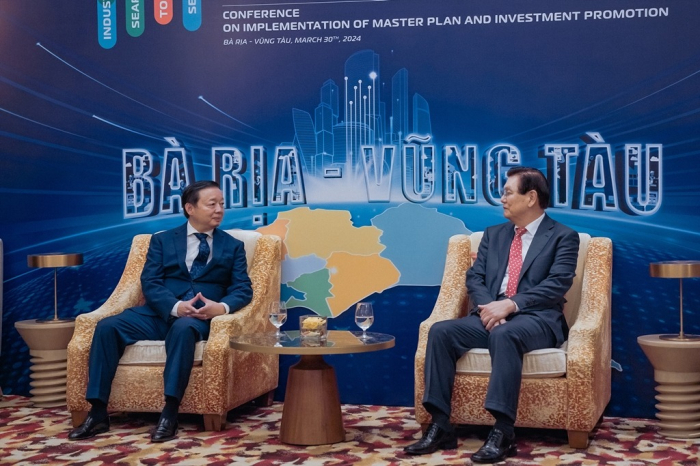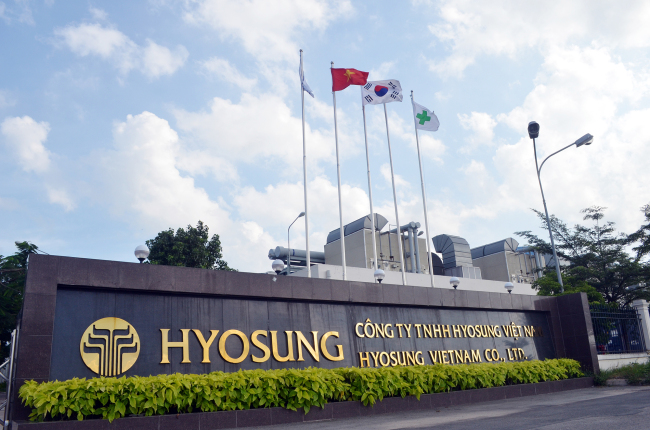Hyosung TNC to promote green production in Vietnam
Hyosung TNC, the world's top spandex fabric maker, will to invest $1 billion in new bio-based raw material factories in Vietnam to spur future growth.
Billion-dollar Plant in Vietnam
South Korea's Hyosung Group's Hyosung TNC recently reported that the Ba Ria-Vung Tau provincial authorities had approved the construction of a new bio-butanediol (BDO) facility with an annual capacity of up to 50,000 tons. The world's top spandex fabric maker plans to develop and market 50,000 tons of bio-based BDO by the first half of 2026. The business also intends to build new facilities to increase manufacturing capacity to 200,000 tons per year.

Vietnam's Deputy Prime Minister Tran Hong Ha (left) and Hyosung Vice Chairman Lee Sang-Woon attended the 'master planning and investment promotion conference' held in Ba Ria-Vung Tau, Vietnam, on March 30, 2024.
Hyosung's textile business intends to manage the world's biggest bio-based spandex fabric production complex, integrating the whole manufacturing process from raw materials to yarn for the first time in Vietnam. The business also intends to create BDO at the new plant and PTMG (Polytetramethylene Glycol) at a neighboring facility in Dong Nai to mass-make bio-based spandex fabric from this raw material.
BDO is a chemical that serves as a raw material for PTMG, a component of spandex fabric. This chemical's applications have extended to include engineered plastics, biodegradable packaging, shoe soles, and industrial compounds. BDO is created by fermenting sugarcane sugar, which may replace up to 100% of present fossil fuel consumption.
BDO's market potential are varied, including both economic and environmental issues. Consumer awareness of the environmental impact of products has increased demand for sustainable materials, pushing BDO's development as a significant player in the green chemicals market. Furthermore, rigorous government restrictions aimed at decreasing greenhouse gas emissions and encouraging bio-based goods help to increase the industry.
Greening Future Raw Materials
Hyosung Group Chairman Cho Hyun-joon claimed in a statement that "the biotech industry, changing traditional fossil raw resources into environmentally friendly materials, will become the main pillar of Hyosung for the next 100 years." We will expand our global market presence using sustainable bio-based resources."
Since the late 2000s, Chairman Cho Hyun-joon has instructed Hyosung TNC, the group's textile business, to meet developments in the global textile sector, which is facing harsher environmental restrictions in Europe and America, by creating sustainable goods. As a result, by 2030, the business hopes to produce 20% of its total spandex fabric sales from sustainable goods, up from 4% now.

Hyosung is among the major investors in Vietnam.
The phrase "sustainable fashion market" refers to a developing trend in the fashion industry that emphasizes social and environmental responsibility throughout the lifespan of a garment or footwear. This plan takes into account the environmental consequences of raw material procurement, manufacturing methods, distribution strategies, and end-of-life product management. Sustainable fashion is a strategy that manufacturers are using to reduce environmental damage and improve ethical conduct.
The need for sustainable alternatives has increased in recent years as consumers become more conscious of the harmful effects of fast fashion on society and the environment. This market sells a wide range of products, from apparel manufactured from sustainable materials such as organic cotton or recycled fibers to goods created in transparently managed and ethical supply chains.
According to Exactitude Consultancy, the worldwide sustainable fashion market is predicted to increase from 7.8 billion USD in 2023 to 27.95 billion USD in 2030, with a compound annual growth rate (CAGR) of up to 20% throughout the forecast period.








